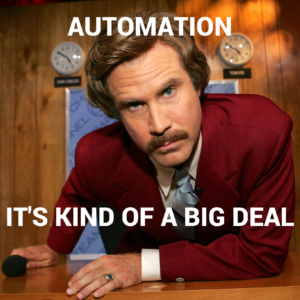In this Sumo Logic Employee Spotlight we interview Michael Halabi. Mike graduated from UC Santa Cruz with a bachelor’s degree in business management economics, spent some time as an auditor with PwC, joined Sumo Logic as the accounting manager in the finance department, and recently transitioned to a new role at the company as a DevSecOps engineer.

[Pause here for head scratch] I know what you’re thinking, and yes that is quite the career shift, but if you stay with us, there’s a moral to this story, as well as a few lessons learned.
Work Smarter, Not Harder
Q: Why did you initially decide business management economics was the right educational path?
Mike Halabi (MH): I fell into the “uncertain college kid” category. While I was interested in engineering, I was also an entrepreneur at heart and knew that someday, if I were to start my own business, I would need a foundational business background as well as a variety of other life experiences outside of textbook knowledge.
Q: How do you approach your work?

MH: Everything in life, no matter how scary it may appear up front, can be broken into a series of simpler and smaller tasks. If you learn how to think about problem solving in a certain way, you can make anything work, no matter how far beyond your skill set and core competency it may originally seem. This is especially true in the technology industry where success often depends on doing it not just better, but also faster, than the competition. Breaking down complex problems into bite size chunks allows you to tackle each piece of the problem quickly and effectively and move on to the next.
Q: What’s the best way for a business to achieve that — doing it better and faster?
MH: Automation. This is applicable across the board. The finance industry is full of opportunities to automate processes. Half of what a traditional finance team spends its time doing is copy/pasting the same information into the same email templates or copy/pasting a formula in excel and manually tweaking each line. In other words, a bunch of tedious outdated practices that could be easily automated thanks to modern programs and technologies.
automate processes. Half of what a traditional finance team spends its time doing is copy/pasting the same information into the same email templates or copy/pasting a formula in excel and manually tweaking each line. In other words, a bunch of tedious outdated practices that could be easily automated thanks to modern programs and technologies.
One instance I recall is someone spending a full day calculating a small subset of a massive spreadsheet line by line: eight hours to do one-tenth of the massive workbook. With a proper understanding of the problem and how to leverage the tools available, I wrote a formula to copy/paste in 30 minutes that completed the entire workbook and is still in use today. Scalable, simple, efficient — this formula removes manual error and works every time. And this was a quarterly project, so that many weeks’ worth of highly paid time is saved every quarter. Low hanging fruit like this is everywhere.
Q: So how did you capture the attention of Sumo Logic’s technical team?
MH: Word got out about my closet-coding (really, I annoyed everyone to death until they let me help with something fun) and soon, various people in various teams were sending side projects on troubleshooting and automation my way. I continued on like this for awhile — finance accounting manager by day, coder by night until I was approached by our CSO and asked if I’d like to transition onto his team as a DevSecOps engineer.
Connect the Dots
Q: Let’s back up. How did you initially get into coding?
MH: I took an early liking to video game development and while I didn’t have a formal engineering or coding background, using the above methodology, I taught myself how to make simple games using C++/SDL.
Then, once I started helping out with various projects at Sumo Logic, I discovered Python, C# and Go. By spending time experimenting with each language I found different use-cases for them and in trying to apply what I’d learned I was pushed into the altogether different world of infrastructure. Making solutions was easy enough, getting them to less technically inclined folks became a new challenge. In order to deploy many of my cross functional projects at Sumo Logic, I had to learn about Docker, Lambda, EC2, Dynamo, ELBs, SSL, HTTP, various exploits/security related to web-based tech, etc. I devoted more of my time to learning about the backend and underlying technologies of the modern internet because making a service scalable and robust requires a holistic skillset beyond simply writing the code.
Q: Are there any interesting parallels between finance and engineering?
MH: As an auditor at PwC, I worked frequently with many companies from the very early startup stage to large public companies, and the problems most all of these companies face are the same. How do we get more done without hiring more people or working longer hours, and without sacrificing work quality. In finance the problem is handled generally by hiring more at a lot of companies.
Q: Can you expand on that?
MH: You need to look beyond the company financials. Increased revenue to increased work can’t (or should never) be a 1:1 ratio. For a company to scale, each individual employee has to understand how his or her role will scale in the future to keep pace with corporate growth and needs. You scale an organization by using technology, not by mindlessly throwing bodies at the work. That’s what I learned from finance. You don’t need a team of 10 people to collect money and write the same email to clients multiple times a day, when you can automate and have a team of two handle it. Manual processes are slow and result in human error. In engineering I think this concept is well understood, but in finance, in my experience, many companies behave as if they’re still in the 1500s with nothing more than an abacus to help them do their job.
Find a Passion Project
Q:What would be your advice to those considering a major career shift?
MH: Our interests and passions will shift over time, and there’s nothing wrong with that. If you decide one day to do a complete 180 degree career change, go for it. If you don’t genuinely enjoy what you do, you’ll never truly advance. I loved designing video games and automating financial processes, which led to my career shift into engineering.
Did I put in long hours? Yes. Did I enjoy it? Yes. Passion may be an oversung cliche but if you aren’t invested in your work, you’ll go through the motions without reaping any of the benefits, including the satisfaction of producing meaningful work that influences others in a positive way.
Q: What’s your biggest learning from this whole experience?

MH: The biggest takeaway for me as a coder was that theoretical knowledge doesn’t always apply in the real world because you can’t know how to make something until you make it. Coding is an iterative process of creating, breaking and improving. So never be afraid to fail occasionally, learn from it and move on.
And don’t put yourself in a box or give up on your dreams simply because you don’t have a formal education or piece of paper to prove your worth. The technology industry is hungry for engineering talent, and sometimes it can be found in unusual places. In fact, finding employees with robust skill sets and backgrounds will only positively impact your team. Our collective experiences make us holistically stronger.

